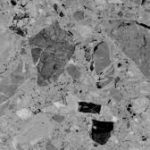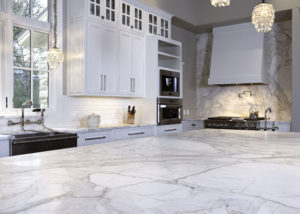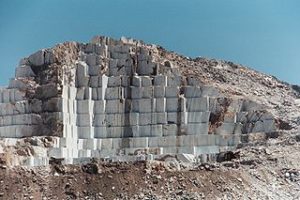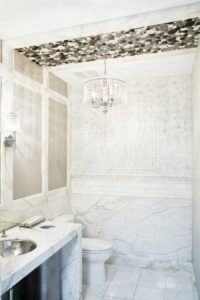Marble has been a popular building material for centuries, prized for its beauty since ancient times.
Today marble countertops are a popular way to bring this classic building material into your home. They can bring beauty and sophistication to your kitchen, bathroom or commercial project.
Graniterra is the leading supplier of marble countertops in the St Louis area and we import natural marble directly from quarries around the globe.
Call us with your questions at (314) 533-3366
In this guide to marble countertops, we will educate you on the material, discuss the pros and cons and answer the most common questions about using marble for countertops.
 What is marble?
What is marble?
Marble is a metamorphic rock that is made from limestone deposits which have been recrystallized over time by heat and pressure from the earth. It has commonly been used for sculpture and as a building material. In contemporary homes, it may be incorporated as a material for countertops.
Why is marble popular for countertops?
Marble has been prized for centuries for its beauty and as a symbol of status, wealth, tradition and refined taste. It is resilient, durable and does not chip or crack easily.
Related: Top materials for Kitchen Counters
Are marble countertops heat resistant?
Marble countertops are heat resistant and can withstand heat without melting or cracking.
Can you put a hot pan on a marble countertop?
You can usually put hot pans on marble without severe damage. However, you shouldn’t place a piping hot pot on marble that has just come off the stone because it can discolor the surface. This is no different than granite or quartz countertops.
Related: Quartz Countertops Guide
 How much do marble countertops cost?
How much do marble countertops cost?
The price of marble can vary depending on the type of marble that you choose, but the most common type of marble known as Carrara is actually inexpensive compared to other natural stone materials. There are rare types of marble that can be expensive.
The average cost of marble countertops on the low end is $40 per square foot. The cost for high-end marble countertops made from rare types of marble can cost 100 per square foot or more.
Are marble countertops porous?
Marble countertops are porous, more so than granite countertops. Because it is more porous than other types of natural stone, it can absorb liquids. Marble countertops can be sealed to help protect the surface.
Related: Granite Countertops Guide
Do marble countertops stain?
Because of its relative porousness, marble countertops can be stained by oil, wine, juice and other spills that are not quickly cleaned up. If a staining liquid is allowed to seep deeply into the stone, they can be very hard to get out. We recommend that you seal the marble surface to help prevent stains.

What types of finishes are available for marble countertops?
Marble countertops are available with either a honed finish or a marble finish. A honed finish is sanded and will give the marble a soft, matte finish. A polished finish is polished so as to have a shiny and bright surface. Honed marble will not show scratches as easily and a polished finish will show more signs of wear over time. Some people do prefer the patina that a worn honed finish will get over time. A polished finish will require more upkeep to maintain its shine. Your decision may come down to personal preference.
How do you care for marble countertops?
It’s recommended that your marble countertop is sealed once a year to help prevent staining. Spills should be wiped up immediately so they don’t have a chance to seep deeper into the surface. For everyday cleaning, you can use simple water and dish soap on a washcloth to wipe your marble counters. Over time, marble is not the easiest to maintain surface but it still appeals to many homeowners because of its beauty.
Related: The Dos & Dont’s of Cleaning Natural Stone Surfaces
How thick are marble countertops?
The standard thickness for marble countertops is two centimeter-thick slabs (3/4 of an inch) or three centimeter-thick slabs (about 1 1/4 of an inch). The two-centimeter slab was the industry standard but recently the 3-centimeter slab has become more popular. The standard thickness for marble countertops is the same as granite.
What are the pros and cons of marble countertops?
 Granite Countertop Advantages:
Granite Countertop Advantages:
- Timeless beauty, and a white brightness not available in other natural stones
- Marble is one of the least expensive natural countertops
- Withstands high temperatures
- Naturally cool surface is great for baking
- No two marble slabs are alike, creating a truly unique look
Granite Countertop Disadvantages:
- Marble can scratch easily
- Surface can stain fairly easily (wine, juice, oil)
- Slab marble counters are difficult to repair
- Needs to be sealed regularly
- Sharp knives can scratch the surface
Related: The Advantages and Disadvantages Of Quartz, Granite, And Corian Countertops
For information on marble countertops contact us online or call 314.533.3366
 Graniterra is located in St. Louis, Missouri and supplies marble, granite, quartz and natural stone countertops, providing expert installation from our in-house team. With over 30 years in the stone business, we have the knowledge & experience to deliver a perfect project. Request a quote
Graniterra is located in St. Louis, Missouri and supplies marble, granite, quartz and natural stone countertops, providing expert installation from our in-house team. With over 30 years in the stone business, we have the knowledge & experience to deliver a perfect project. Request a quote
More Marble Countertops Information:
My Experience of Living With Marble Countertops: One Year Later – Kitchn
Marble Countertops 101: Yes, They’re a Great Idea! – Apartment Therapy
Would I Be Crazy to Choose Marble Countertops for My Kitchen? Marble Countertop Pros and Cons – Kitchn
5 Things No One Told You About Marble Countertops – House Beautiful
Marble Captures The Elegance That All Other Countertops Try to Match – Countertop Investigator



